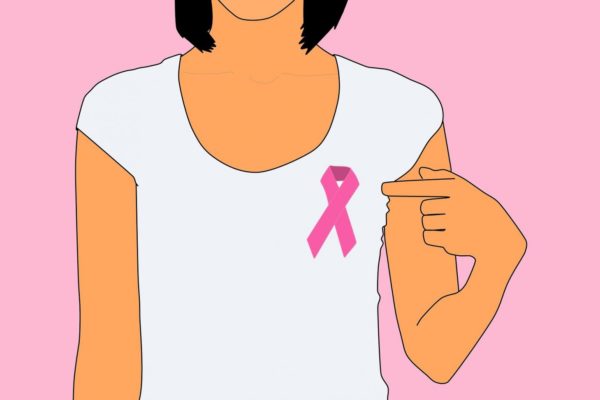The moments after a diagnosis are some of the hardest for breast cancer patients and their loved ones. And the health care system is not structured to make this time easier.
“You have cancer.” One small phrase can change the life of someone who has been waiting anxiously since finding the first lump. What happens after the pathologist confirms what you’ve been dreading?
We asked experts in oncology, social work and cancer support at UT Austin’s Dell Medical School and Steve Hicks School of Social Work, and the LIVESTRONG Foundation to walk us through the milestones while sharing their insights on what’s needed most to address the gaps.
What happens after diagnosis? They hang up the phone.
“It might be surprising, but many diagnoses end up being communicated by phone on a Friday afternoon before offices close for the weekend,” says Gail Eckhardt, director of the LIVESTRONG Cancer Institutes and chair of the Department of Oncology at Dell Med.
No matter how the life-changing news is put, this leaves the new cancer patient with at least 48 hours to wrestle with it alone before being able to follow up with an oncology team. Even if the diagnosis isn’t delivered on a Friday, the patient rarely receives immediate, robust support to begin processing it.
Supporter action: Know of someone expecting news from a screening? Reach out often and communicate your willingness to also provide a listening ear when the news arrives.
You meet your oncologist — and cover a lot of ground.
During the first weeks of trying to understand a cancer diagnosis, the patient is often flooded with information about the disease and potential treatment pathways. Care providers sometimes move more quickly than their patients — before they have a chance to come to terms with their new reality, says Barbara Jones, associate director for social sciences and community-based research at the LIVESTRONG Cancer Institutes and associate dean for health affairs at UT’s Steve Hicks School of Social Work.
Supporter action: Go to as many appointments as possible with your loved one to listen and provide support if he or she is open to it. Your questions and information gathering can provide additional insight.
Your doctor gives you a treatment plan.
Well, not quite, although the process can be very transactional, Eckhardt says. There are varying models for how much patients contribute to their treatment plans. No matter the level of shared decision-making, it’s vital for people to fully grasp the options, discern their choices, and understand the personal, familial and financial implications.
“These conversations are hard to have,” explains Rebekkah Schear, director of mission delivery at the LIVESTRONG Foundation. “Care providers may not have the time to patiently walk through all the details, and the stigma around cancer is so great that many people aren’t able to grapple with the identity questions that impact treatment decisions.”
Supporter action: As your loved one explores options, help find support to work through the tough questions that arise.
You feel — and watch — your body change.
As anyone who is a cancer survivor or supporter knows, undergoing treatment comes with myriad challenges. Mental, physical, emotional … you name it. According to our experts, this is when the rapport built with a patient can make a huge difference in quality of life. An engaged, compassionate and responsive interdisciplinary care team should be available for patients and their caregivers — available to console, advise, listen and deliver.
Supporter action: Bookmark and use this online resource for caregivers of a loved one with cancer.
You return to your life, where there is a “new normal.”
Although the end of treatment is cause for celebration, it is also often cause for anxiety as survivors find their place again with a changed body and soul. An often-cited report titled “From Cancer Patient to Cancer Survivor: Lost in Transition” finds that many cancer survivors face psychological, social, spiritual, practical and medical challenges that contribute to a lower quality of life and negative health outcomes.
Supporter action: Help your loved one reassess his or her values, needs and lifestyle goals after treatment. See “The Road to Survivorship” from the LIVESTRONG Foundation.
About LIVESTRONG Cancer Institutes at UT:
A partnership between the Dell Medical School and Austin-based LIVESTRONG Foundation, the LIVESTRONG Cancer Institutes are reinventing the complete continuum of cancer care, from prevention and detection to research, treatment and survivorship. Next year, the Institutes will launch an oncology practice where they plan to tackle the roadblocks so many current patients face after they have been diagnosed.
What if a trained expert were immediately on hand to answer questions about diagnoses and offer a comforting presence during nontraditional clinic hours? What if a team of specialists wrapped around the individual and his or her family, not around the disease, to provide whole-person care? What if local providers partnered to address the gaps in patient support? These are the types of questions the Central Texas cancer community is exploring together.
Do you have questions about care and support in Austin?
See these resources for breast cancer patients and caregivers:
Austin Cancer Centers
Breast Cancer Resource Center
Komen Austin
Regarding Cancer
Texas Oncology
LIVESTRONG Foundation
Wonders and Worries
American Cancer Society




